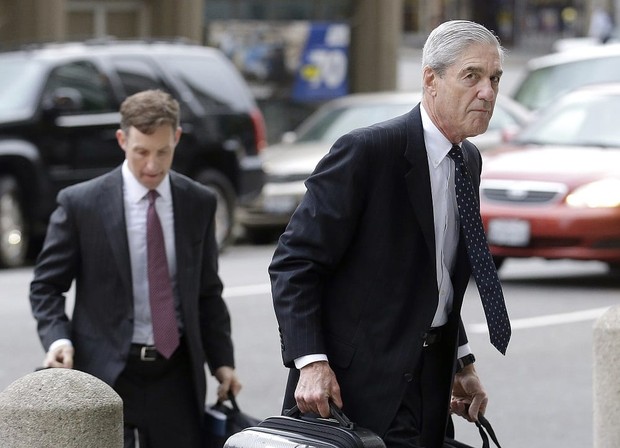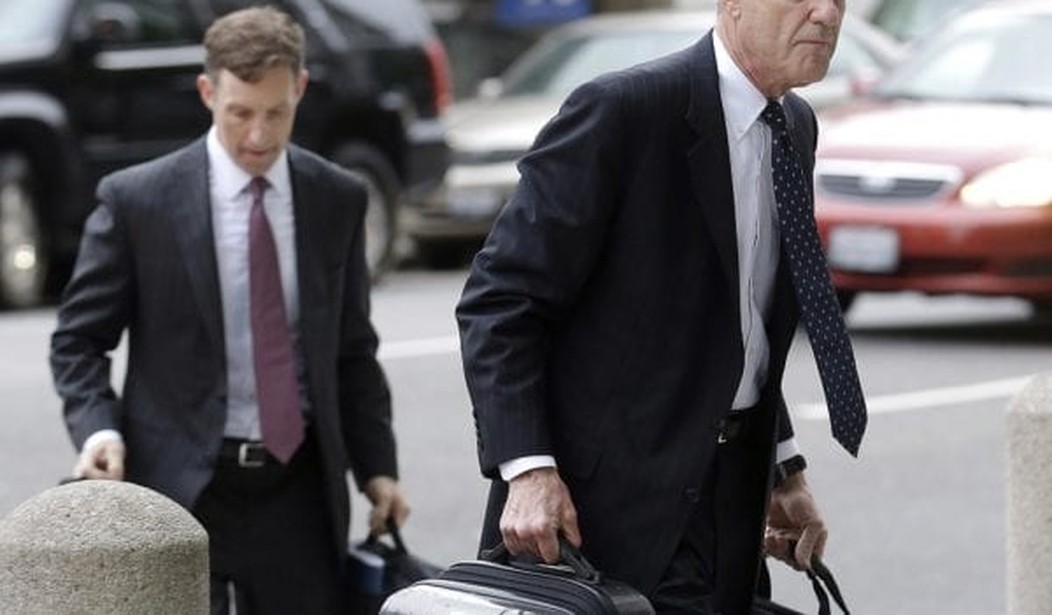
FILE – In this April 21, 2016 file photo, attorney and former FBI Director Robert Mueller, right, arrives for a court hearing at the Phillip Burton Federal Building in San Francisco. Mueller has been overseeing settlement talks with Volkswagen, the U.S. government and private lawyers. Mueller is being honored with an award from West Point. The U.S. Military Academy’s Association of Graduates will present the Thayer Award to Mueller on Thursday evening, Oct. 6, 2016. (AP Photo/Jeff Chiu, File)
In the next few days, I’m going to post a few times on what I believe is going on with the fight over the Mueller report that boiled over into the media late last week. On Thursday, the New York Times and Washington Post ran stories, similar to each other in content and neither had on-the-record sourcing, claiming, with no evidence beyond innuendo, that the summary of Mueller’s report released by Attorney General William Barr last Sunday covered up evidence of President Trump “obstructing” the investigation. First, let’s consider the ludicrous nature of that charge. Trump, ultimately, has the authority to halt any investigation he wishes, he is, as referred to at the time of the Founding, the “Chief Magistrate.” The Attorney General and all executive branch employees work for him and they work on things which he allows. No one in the FBI has the statutory authority to carry on an investigation if the President says no. Second, Mueller’s investigation spanned some 670 days and produced a report. That is one of the worst jobs of obstruction in history. Finally, it seems that the White House worked very closely to get Mueller whatever documents he wished and they encouraged people to cooperate. Again, a terribly incompetent way to obstruct or impede an investigation.
The current brouhaha is over whether Barr should have used summaries prepared by Mueller’s team rather than his own. This story, I believe, is critical to understanding Barr’s decision.
On October 5, 2017, a minor player in President Trump’s campaign, a young man named George Papadopoulos, was indicted by Mueller’s henchmen for lying to federal agents. The crux of the allegation was him misstating when he first met a guy name Joseph Mifsud. Mifsud portrayed himself as having connections to the Russian government, though now it seems much more likely that he was a British intelligence asset aimed at the Trump campaign on the authority of someone in the US government. I add the latter part because the Brits would have no vested interest in running either Mifsud or Stephen Halper or Alexander Downer at the Trump campaign unless they were operating with the US government.
When Iowa Senator Chuck Grassley, then chairing the Senate Judiciary Committee read the “statement of offense” detailing Papadopoulos’s “crime” he complained to Mueller that the statement misrepresented the evidence. This from The Daily Caller’s indefatigable Chuck Ross:
“The public deserves to have the full context for the information the Special Counsel chooses to release. The glaring lack of it feeds speculation and innuendo that distorts the facts,” Iowa Sen. Chuck Grassley wrote to special counsel Robert Mueller on Oct. 16, 2017.
Grassley, who then chaired the Senate Judiciary Committee, was responding to a “statement of offense” released in the case against Papadopoulos, the Trump campaign adviser who entered a plea deal in the special counsel’s probe on Oct. 5, 2017.
Prosecutors quoted from several emails in a way that suggested top Trump campaign officials were eager to meet with Russians. But Grassley asserted that the full emails showed that campaign officials rebuffed the idea of meeting with Russians. The Iowa Republican took Mueller’s team to task for failing to correct news reports that cited the Papadopoulos court filings as evidence of possible collusion with Russia.
…
In the letter to Mueller, Grassley pointed to two sections of the Papadopoulos “statement of offense” that quoted from emails sent on May 4, 2016 and Aug. 15, 2016.In the May 4 email, Papadopoulos wrote to others on the Trump campaign that Russia “has been eager to meet Mr. Trump for quite sometime and have been reaching out to me to discuss.”
Mueller’s team quoted from an email response from Trump campaign chairman Paul Manafort, who wrote: “We need someone to communicate that DT is not doing these trips. It should be someone low level in the campaign so as not to send any signal.”
Numerous news outlets reported that the passage showed that Manafort wanted a low-level campaign adviser to meet with Russians. But Grassley said that other emails sent by Manafort’s deputy, Rick Gates, show that he was asserting that a low-level adviser should be the person to reject requests to meet with Russians.
“Agree. What if I get our correspondence coordinator to do it. This is the person responding to all mail of non-importance. It would be a general letter,” Gates wrote.
Manafort replied: “good.”
Grassley also faulted Mueller’s team for misrepresenting email exchanges involving Sam Clovis, another Trump campaign official.
The statement of offense quoted from an Aug. 15, 2016 email in which a campaign supervisor, later identified as Clovis, told Papadopoulos that “I would encourage you” to “make the trip, if it is feasible.”
But Grassley said the rest of the email makes clear that Papadopoulos asked Clovis to join him on conversations with representatives from several foreign governments, including “the UK, Greek, Italian and even Russian government.”
Clovis declined the invitation and wrote in other emails that any potential meetings with Russians would have to follow meetings first with Western allies.
“My thought is that we probably should not go forward with any meetings with the Russians until we have had occasion to sit with our NATO allies, especially France, Germany and Great Britain,” wrote Clovis. “We need to reassure our allies that we are not going to advance anything with Russia until we have everyone on the same page.”
Long story short, what Mueller’s team did was take a questionable offense, that would be misstating the date of a meeting more than a year after the fact, and tart it up with emails that were not only no germane to the issue but which clearly tried to portray the Trump campaign as eager to make contact with Russia. The emails they used actually showed just the opposite, that the campaign was very wary of making any contact with Russia outside the context of a larger outreach to all our European allies, but Mueller’s team edited them to show just the opposite. (Trivia question: who on Mueller’s team has a track record of doing unethical and/or illegal stuff like this?)
This “statement of offense” set off a firestorm in the Russia-collusion industry that has seemingly sane people, some of them writing here, claiming that Papadopoulos was going to be the guy who brought Trump down because he was “flipping.”
In retrospect, it looks like this was part of an information operation conducted by Mueller’s team to keep the collusion hoax alive in the public arena even though they already knew it was, well, a hoax.
Grassley Letter to Mueller by on Scribd
=========
=========
Like what you see? Then visit my story archive.
Follow @streiffredstate
I’m on Facebook. Drop by and join the fun there.
=========
=========













Join the conversation as a VIP Member